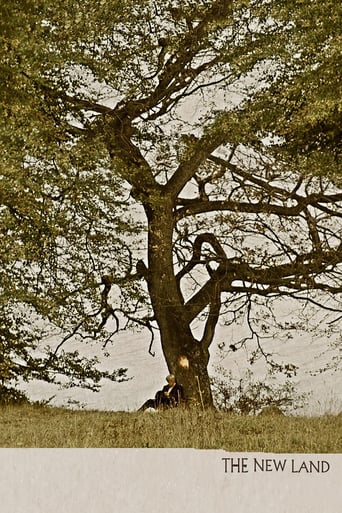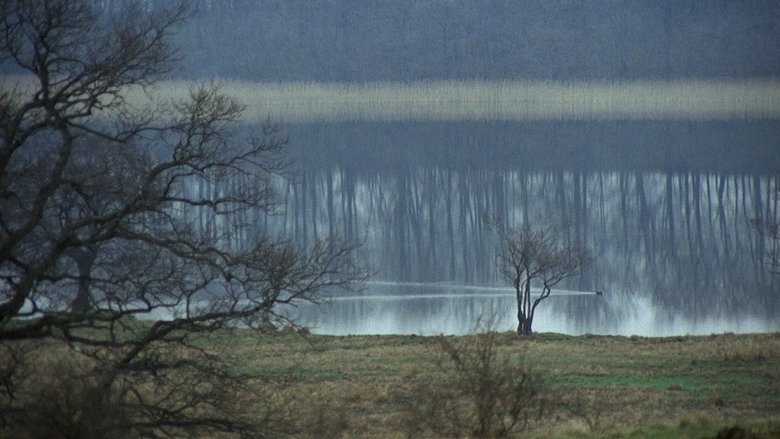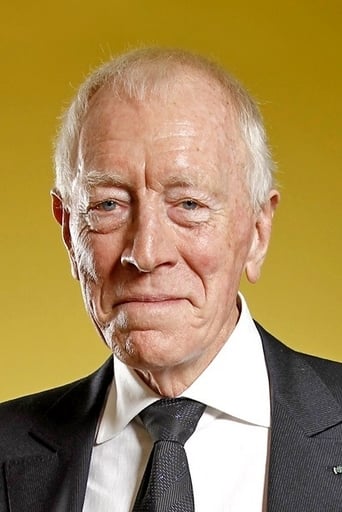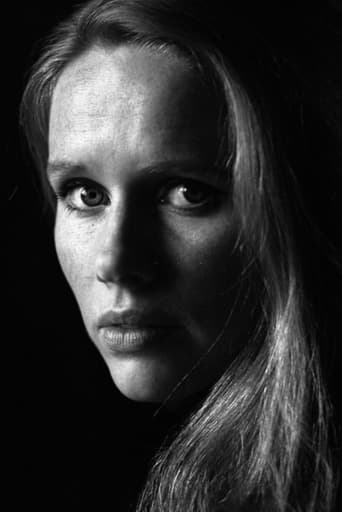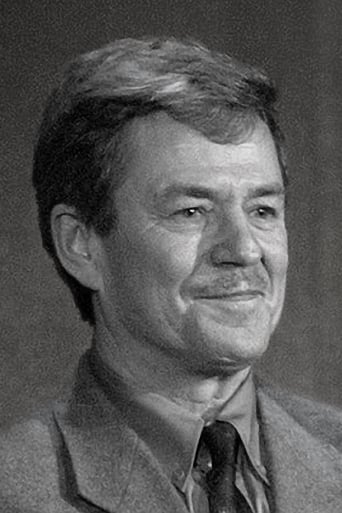The New Land (1973)
A Swedish immigrant family struggles to adapt to their new life on the American frontier during the second half of the 19th century amidst civil war, native uprising and the lure of gold in California.
Watch Trailer
Free Trial Channels
Cast


Reviews
Very well executed
not as good as all the hype
The storyline feels a little thin and moth-eaten in parts but this sequel is plenty of fun.
Great example of an old-fashioned, pure-at-heart escapist event movie that doesn't pretend to be anything that it's not and has boat loads of fun being its own ludicrous self.
Swedish filmmaker Jan Troell's categorical pièces-de-résistance, a diptych, 7-hours long saga based on his fellow countryman, the literature titan Vilhelm Moberg's THE EMIGRANTS ensemble. Divided into THE EMIGRANTS and THE NEW LAND, this 19th-century epic holds a dear look at the travails of an ordinary Swedish household, the Nilsson family, resides in the Småland hinterland, when (mostly natural) adversity mounts against their livelihood, the eldest son Karl Oskar (von Sydow) mulls over the prospect of emigrating to the United States. A proposition deprecated by his wife Kristina (Ullmann) initially, but when poverty and hunger is aggravated by the premature death of one of their brood, she eventually accedes, joining their emigrating pack are Karl Oskar's younger brother Robert (Axberg), his farmhand friend Arvid (Lindstedt), the family of Kristina's uncle Pastor Daniel Andreasson (Edwall, a straight-up hard-hitter, brilliantly bringing about an air of smug virtuosity that treacherously verges on hubris), who is at loggerheads with the supercilious local parish clergy for preaching to the fallen ones (viz. those who are deemed not worthy of Christian gospel), among whom a former prostitute Ulrika (jazz chanteuse Monica Zetterlund), now a reborn woman, also partakes in the trek with her teenage daughter Elin (played by Monica's own daughter Eva-Lena Zetterlund). THE EMIGRANTS itself can be bisected into two halves, before and after the family's embarkment for the state of Freedom, during the former, Troell introduces the hardship and inequity (religious parochialism and mistreatment) with a pastoral equanimity (occasionally lard with invigorating drumbeats) and purveys his main characters with sufficient impetus for their longing for a reset button in an idealized country where everyone is (purportedly) being treated equally and fairly, especially for the young Robert, it is the California gold rush beckons him, and supports him against the cavalier abuse he receives on a daily base when working as a farmhand. Once their journey kick-starts, a looming nostalgia begins to sweep the cohort, Troell (who is also presiding over the cinematography department) fixes the valediction shot with a subdued solemnity, no goodbyes, tear-infused eyes, lingering looks are deployed, just a long-shot of the elderly parents seeing their children off in front of their house, incorporating the place into their final adieu, and the impact is ineffable. Tellingly, THE EMIGRANTS' most accomplished passage is the ten-weeks trans-Atlantic voyage on a wooden brig, and Troell valiantly re-enacts its sordid state of affairs with swingeing maritime verisimilitude when most passengers are fallen victims of sea-sick, life is snuffed within a two-by-four space, by scurvy or even quinsy (a pertinent reference to today's illegal immigrants' ordeal on the sea). Here Liv Ullmann holds court in two magnificent scenes, one is Kristina's altercation with Ulrika, both actress are emotively unsparing, and letting out their prejudice and retorts once for all, which also presciently serves as a catalyst for their eventually best-friends transition; the other is when Kristina, apparently in extremis, exchanges with Karl Oskar their fondness, as if for the last time, by confessing that they are each other's best friends, a superlative affirmation that true love does exist thanks to the two players' most poignant delivery. Once the survivors touches the terra firma but incognita, they are still miles away from where they will start life anew, hopping on the train and later a steamer, than on foot, when they finally reach their destination in Minnesota, their first dream is dashed by a boastful liar who never expect his lie will be debunked in his face, and THE EMIGRANTS finishes when Karl Oskar finds their new land under their new identities, American homesteaders. Right picking up where its predecessor leaves, THE NEW LAND takes place entirely in the new land, where the Swedish emigrants forming a somewhat enclave, mostly living among themselves, which brings about a problematic issue about the story's sense of locality and Troell's inaction of alleviate this anonymity, if it is not for the random appearances of the indigenous Indians, one can safely surmise that the household is still live in their homeland, with very similar sylvan exuberance and harsh winter-time, and not much foreignness to interact with, in a way, it takes the shine off one of the story's focal points: displacement. Yet, what THE NEW LAND excels in, is that oater flashback of Robert, who manages to stay alive just long enough after a futile gold-digging attempt with Arvid, a sounding slap in the face to the wide-eyed daydreamers, the pair is saddled with the same drudgery and hardship (not to mention Robert's potluck is rooked by deception) that ultimate will cost them both their young lives, here Troell launches a more hallucinogenic experiment in accentuating the pair's delirium and exhaustion when wandering in the desert, to admirable effect. Eddie Axberg has weathered convincingly in honing up Robert's tale of woe, and his final resignation with fate effectually brings a lump in one's throat. Life goes on, as Karl Oskar's household finally prospers, a God-fearing Kristina turns out to be benighted enough to risk her own life for the sake of procreation, indoctrinated as a wife's sacrosanct duty, even after receiving the doctor's warning that another pregnancy would become her undoing, together with a less disinterested depiction of a wanton slaughter during the Sioux Uprising, by suggestion that it is at the expense of those white homesteaders' hospitality upon which the Indians conducts their retaliation, THE NEW LAND's luster starts to ebb away, notwithstanding a show-stopping Max von Sydow consistently radiates with plebeian bonhomie, sympathy and mettle from stem to stern of the entire roman-fleuve.
Utvandrarna and Nybyggarna The Swedish film Utvandrarna was shown in the U.S. with the title The Emigrants (1971). The film Nybyggarna was shown with the title The New Land (1972). Both movies were co-written and directed by Jan Troell. Troell was also the cinematographer and the editor of both. (Sounds crazy, but he did it.) The films are actually one long film, broken in half so that each could be seen separately. As can be guessed from the titles, the first film sets up the plot by showing us that, despite intelligence and hard work, many families couldn't make a living on the small plots of land in Sweden. The second film follows the family from Sweden to the United States. The situation for them in the U.S. isn't that much better when they arrive, but they have reasonable hope that they will succeed. Max von Sydow plays the husband, Karl Oskar, and Liv Ullmann plays his wife, Kristina. Both are extraordinarily talented. In addition, Von Sydow is handsome, and Ullmann is impossibly beautiful. The remainder of the cast is strong, and the acting by the children is wonderful. These movies will work better on the large screen, but we had to settle for the small screen. Both films carry very high IMDb rating of 8.0. I gave each a 10.
Swedish screenwriter, film editor, cinematographer and director Jan Troell's fourth feature film which he edited, photographed and co- wrote with Swedish screenwriter and producer Bengt Forslund, is an adaptation of the novels "The Settlers" (1956) and "The Last Letter Home" (1959) by Swedish author Vilhelm Moberg (1898-1973) which is the last two parts of his tetralogy, "The Emigrants suite" (1949-1959). It premiered in Sweden, was shot on locations in Sweden and USA and is a Swedish production which was produced by Bengt Forslund, is the second and last part of a two-part film and was preceded by "The Emigrants" (1971) and was produced by Bengt Forslund. It tells the story about Karl-Oskar Nilsson and Kristina Johansdotter who after having emigrated from Småland, Sweden with many other Swedish emigrants, travels from New York City, USA to an area in Taylor Falls, Minnesota, USA. Karl-Oskar finds and claims a piece of land for his family at a place called Ki-Chi-Saga and there they settle after saying goodbye to his brother Robert and his friend Arvid. Acutely and engagingly directed by Jan Troell, this period drama set against the backdrop of America during the late 1850s and 1860s, draws an extensive and gripping portrayal of a group of Swedish emigrants who travels to the United States to make new and better lives for themselves and a compassionate portrayal of a relationship between a peasant and his wife who are striving to support their children and themselves in a foreign country during the American Civil War. While notable for its poignant production design by Swedish art director P.A. Lundgren (1911-2002), the brilliant cinematography by Jan Troell and the fine costume design by Swedish costume designer Ulla-Britt Söderlund (1943-1985), this character- driven and dialog-driven epic examines themes like family relations, interpersonal relations, friendship, poverty, religion, cultural differences, love, courage and dignity.With the natural surroundings playing an important and symbolic part of the story and depicting various character portrayals, this reverent sequel becomes an in-depth study of character, has a distinct atmosphere which is emphasized by the naturalistic milieu depictions and the efficient score by Swedish composers Bengt Ernryd and Georg Oddner (1923-2007) and is impelled and reinforced by the empathic and involving acting performances by Swedish actors Max von Sydow and Eddie Axberg, Norwegian actress Liv Ullmann and Swedish actress and singer Monica Zetterlund (1937-2005). A finely narrated and illuminating historic drama which was nominated for an Academy Award for Best Foreign Language Film at the 45th Academy Awards in 1973 and gained, among other awards, the NBR Award for Best Actress Liv Ullmann at the National Board of Review Awards in 1973, the NSFC Award for Best Actress Liv Ullmann at the National Society of Film Critics Awards in 1974 and the Guldbagge Award for Best Actor Eddie Axberg and Best Supporting Actress Monica Zetterlund at the Guldbagge Awards in 1972.
In the 1970s, The Emmigrants and The New Land became a combined surprise success in America. I saw them on back to back nights at a theater in Northern California.They even spawned a short-lived TV series on ABC in 1974, also called The New Land, and featuring a young Kurt Russell. Today, no bottom line fixated TV executive would green light such a drama series. What? No cops, no doctors, no forensic experts? No go. I guess the 70s were a more adventurous time in TV programing. In any case, the series was canceled after one season. I recently read Vilhelm Moberg's novel (I think there were really three novels in this saga), The Last Letter Home, and while Karl-Oskar dies at the end of the novel, he does not suffer quite the humiliation his character suffers in the film. At the end of the film, I seem to recall that he had been forced (by bad health, perhaps?) to leave his farm and live in as an anonymous shuffling old man in some urban setting. In the novel he is still on his farm when he dies. Perhaps Jan Troell, the director of the film was trying to make a point about how the struggles of the pioneers are not remembered or honored by those generations who came after them. it's too bad these films seem to have also slipped from our collective memory.

